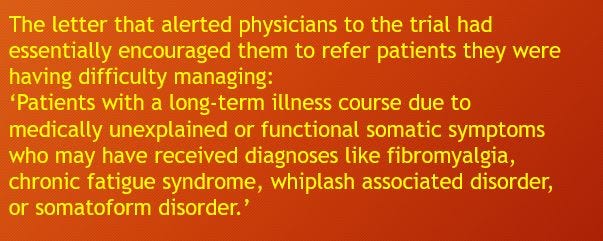https://jimcoyneakacoyneoftherealm.substack.com/p/danish-rct-of-cognitive-behavior?
Danish RCT of Cognitive Behavior Therapy for Whatever Bothers Your Physician About You
More at link
Danish RCT of Cognitive Behavior Therapy for Whatever Bothers Your Physician About You
The flawed RCT was actually an advertisement for Per Fink's clinic providing psychiatric diagnoses to chronically physically ill patients whom other physicians had difficulty diagnosing and managing.
2023 Introduction: Persons with chronic fatigue syndrome or long Covid beware.
An earlier version of this Substack article, Danish RCT of cognitive behavior therapy for whatever ails your physician about you, was originally posted as PLOS Blogs Mind the Brain December 7, 2016. PLOS Blogs subsequently shut down all psychology posts. The original version was stored in a damaged archives, with all comments lost.
My warning from the 2016 article is especially important today.
In 2023, the obvious addition would patients with Long Covid.
[...]
More at link

